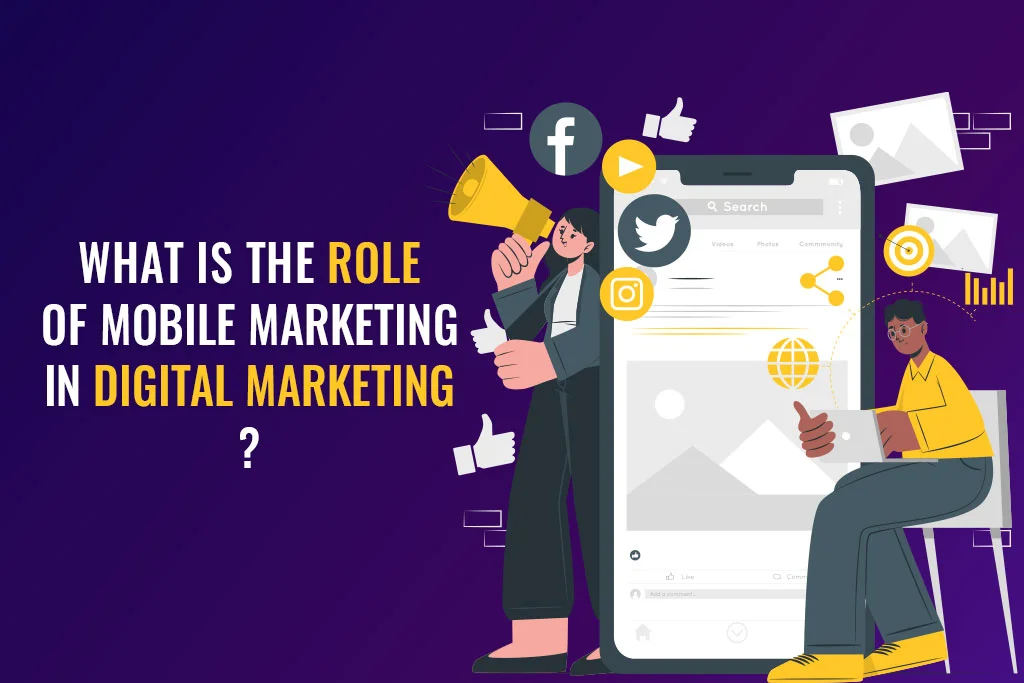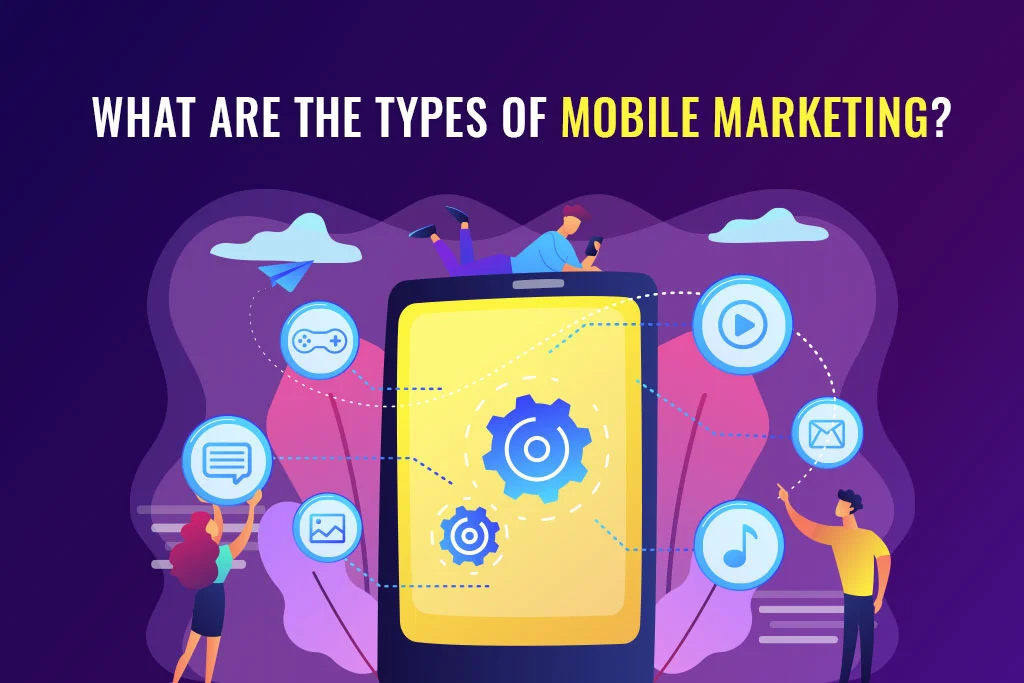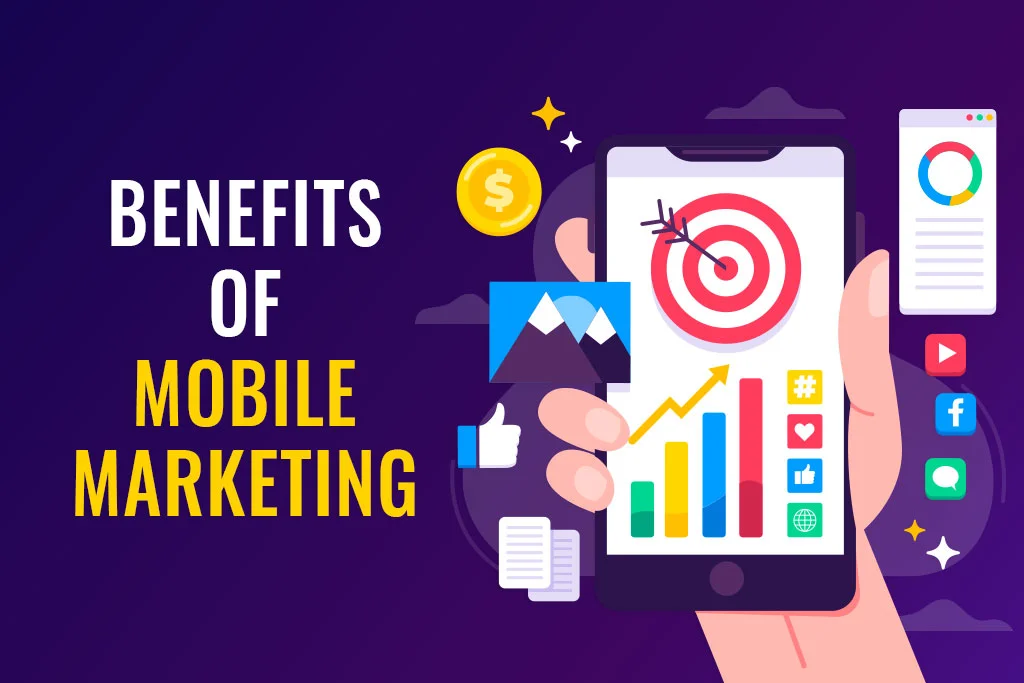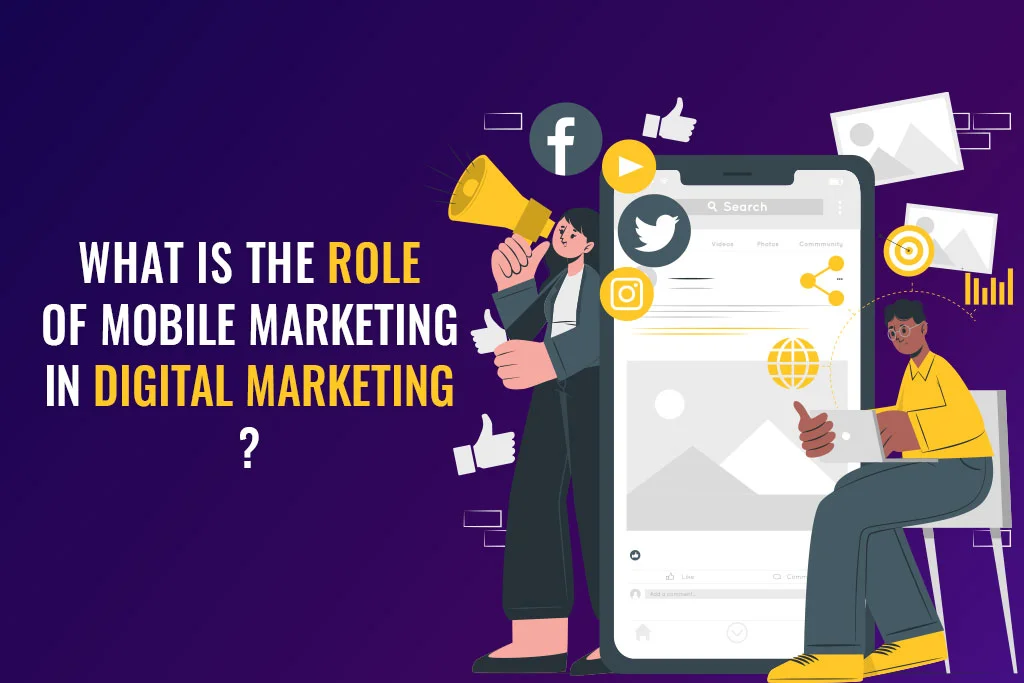What Is The Role Of Mobile Marketing In Digital Marketing?

Mobile devices have become essential in this digital world. It illustrates the need for firms to incorporate mobile components in their digital marketing initiatives. Mobile marketing, which directs messages to users through mobile phones and tablet devices, is particularly important now. This 70% of the world’s internet traffic travels on it.
We are living in a world where people spend an average of 3 hours a day on their phones. This means businesses have the ideal conditions to effectively reach a greater number of customers. Mobile marketing provides businesses today with a very powerful tool for dealing with their customers in the mobile era. It gives them the opportunity to remain relevant and grow further in the age of the internet. This blog will cover mobile marketing, its types, benefits, and the role of mobile marketing in digital marketing.
What Is Mobile Marketing?
Mobile marketing represents the most effective online advertising strategy which encompasses the reach of people through their mobile devices. It includes web pages, email, SMS, and apps. There is a difference between mobile marketer and traditional marketer that the key is to target the customers based on their activities, not on their demographic footprint like age or gender. Businesses that understand and leverage the trend of mobile devices wide-scale use can achieve this by communicating with the audience, wherever they are. It keeps its message in touch with the modern connect-through-mobile world.
Types of mobile marketing:

Mobile marketing techniques are used across a variety of platforms. It includes social media, mobile-optimized websites, and smartphone apps. It provides unique marketing and advertising choices, such as:
App-Based Marketing:
App-based marketing where its main platform is the mobile apps, which constitute 80% of all mobile device activities is the one I am choosing. Businesses can use services such as Google AdMob to produce mobile ads that are displayed within third-party apps. It reduces the need to construct their apps. This strategy helps advertisers target a large audience already using mobile apps. It enhances exposure and conversion opportunities.
Social Media Marketing:
Organic social media marketing involves providing useful material. It increases engagement and builds a community, with a focus on genuine connections and user-generated content. On the other hand, paid social media marketing, uses platform ads. It helps them to reach specific audiences and fulfill marketing goals, with flexible formats and performance tracking data.
Location-Based Marketing:
Location-based marketing is aimed to reach people who are near the area of interest. Its functions are performed by advances such as Bluetooth, Wi-Fi, and near-field communication. With such a strategy in place, businesses can reach out to those customers who are in the proximity of a physical location, for example, a shop or an event venue. By using GPS or cellular data to create virtual boundaries around certain areas, marketers may provide customized messages and promotions to people within those boundaries. It increases the importance and effectiveness of their marketing activities.
Display Ads:
There are two types of display ads. Display ads, mobile search ads, and mobile picture ads. Mobile search marketing, which is optimized for Google searches on mobile devices. It often includes additional elements such as click-to-call or maps. Mobile picture ads are highly focused advertisements created specifically for mobile devices that use images to catch users’ attention and efficiently deliver messages.
Search Engine Marketing:
Search engine marketing enables a website to show high in search results using natural ways to optimize the content and the structure. For instance, Paid search marketing, or PPC, involves marketers bidding on keywords to have their ads presented in search results. This allows them to show their advertisement when the web surfers do similar searches. It resulted in increased traffic to their website via sponsored placement.
SMS And Push Notifications:
SMS marketing and push notifications provide direct user engagement via mobile devices. It makes them suitable for promotions, alerts, and updates. These channels offer specific communication. They create a direct link with the audience and increase engagement by sending relevant and timely messages directly to their devices.
Email Marketing:
In email marketing, subscribers are kept updated and involved by using emails to communicate with them. It has become a tool for lead generation, customer retention, and business prospects. Because, it sends out useful information, offers, and news to inboxes of subscribers.
QR Codes:
QR codes are known as readable barcodes. These barcodes can be scanned using smartphones to take users to e-mail, websites, landing pages, product pages, and digital information. It is a two-way communication between the company and the audience. QR codes also provide the company with mechanisms to track engagement metrics.
It also provides useful insights into user behavior.
Benefits of Mobile Marketing:

There are various benefits to including mobile marketing in the whole marketing plan. Some of the most common benefits of mobile marketing are the following:
Increased Mobile Usage:
Mobile marketing is the most popular method to access the internet. It provides access to the right audience for the business. With the common availability of internet connectivity on mobile devices, businesses may effectively interact with their target audience. They interact even on a tight budget or by relying on the popularity of smartphones and tablets.
Location-Based Targeting:
Mobile devices allow marketers to target clients based on their location via location-based advertising. This technique addresses potential clients in real time. It provides personalized information and promotions based on their present location. It increases relevance and engagement.
Cost-effective:
It is a cost-effective way for companies to be able to reach a mass target audience. Here, most mobile devices have internet access, so businesses may successfully target their chosen audience with limited financial resources, and maximize their reach and impact.
Increased Conversion Rates:
The smartphones account for more than 80% of online purchases. A well-crafted mobile marketing campaign may greatly increase conversions and sales. It gets profits by engaging customers on their chosen devices.
Enhanced User Experience:
Mobile marketing campaigns using interactive components such as quizzes, games, and augmented reality. It can improve user experience and brand engagement. This increases brand exposure and loyalty, resulting in higher conversions and sales. It gives customers an engaging and memorable experience.
Viral Button:
When marketers started to believe that a viral button exists. Many things go viral on a mobile device. This means that the more you engage with your customers on a mobile device, with creative marketing, the more likely you have a chance to go viral at some point. Please note though, that there are no guarantees.
The Role of Mobile Marketing In Digital Marketing:

In the digital age, more than ever, you would find that many people depend on smartphones. It makes mobile marketing essential for businesses. Every business has to develop a strong mobile presence to remain competitive. In modern times, mobile phones have become a necessity so for businesses mobile marketing is taken seriously to reach the target audience effectively. This assures accessibility and convenience for consumers, who prefer to interact with content on their phones. This is because they are user-friendly and can be accessed at any time.
Marketers understand this fundamental truth that to be able to target and involve customers, the website should be mobile-friendly. For large or small businesses to stay relevant in the market, they should have a powerful mobile marketing strategy. It is the most important thing once you know the mobile audience preference because trust and loyalty for customers will be the outcome. Mobile marketing not only provides the means to connect with larger audiences more interactively and engagingly but also serves to enrich the brand image and promote the growth of the business.
We are going to discuss the role of mobile marketing in small and large businesses:
Rank Higher In Search Engines:
Google’s new algorithm helps mobile-friendliness sites to be weighted higher in the ranking of the search. It emphasizes the need for mobile marketing compliance for increased visibility. When you follow the mobile optimization principles, it improves search engine ranks and visibility. It allows you to reach your target audience more effectively.
Mobile Commerce:
Mobile commerce is growing rapidly. Its mobile accounted for e-commerce profits of 24.4% by the end of 2017. Social media networks are embracing this trend by adding “SHOP NOW” buttons. Brands could take advantage of this by using mobile-specific ads, and search engine marketing. Its mobile-friendly pages are used to engage customers anytime, anywhere.
Build Relationships:
In this digital era, the mobile phone is easily in users’ hands. It offers unparalleled accessibility. Mobile marketing facilitates reaching customers anytime, and anywhere. It fosters long-term relationships. You can inform them about the latest sales and new launches via mobile channels. It makes them feel valued and appreciated. Also, it enhances loyalty and drives engagement.
Result-oriented:
Mobile marketing differs from other digital tools like email marketing. While emails are often deleted without being opened. Mobile marketing, especially the SMS industry has a higher engagement rate, with 98 percent of phone users reading the messages they receive. It reflects the effectiveness of mobile marketing in audience capturing and engaging.
Conclusion:
In the competition of the digital era mobile marketing is important to maintain the competitiveness of the companies. By using mobile devices, mobile marketing has become an integral part of customer engagement strategy. It helps to create seamless experiences for users, drives purchases, and increases revenue and profits. Mobile marketing closely follows the trend of mobile usage. It requires different methods, such as mobile-friendly websites, SMS marketing, and mobile applications to create an interaction with clients on their favorite smartphone.
With mobile marketing, you combine them to form part of your digital marketing strategy. It is a new tool in today’s very dynamic and diversified digital marketing environment that makes you relevant and successful in the online world. If you’re looking for a trusted digital marketing agency to boost your search engine ranking, or targeted advertising campaigns to reach new audiences. Our team of experienced professionals at MediaEclips has the expertise to deliver exceptional results.
FAQs:
It is the process of advertising and promotion designed deliberately for the use of mobile devices. Mobile marketing includes smartphones and tablets. It employs a mobile-friendly website, using mobile apps, SMS marketing, and mobile ads to engage with and influence potential customers on their smartphones.
Mobile marketing relates to the strategy to reach and engage with potential customers on mobile devices. With mobile-specific approaches, businesses can boost customer engagement. You not only create awareness but also draw customers and it helps in the growth of revenue and sales.
Mobile marketing is part of the digital marketing as a whole. Alongside this, digital marketing is the broader term involving digital marketing activities. It covers different communication routes such as websites, search engines, social media, email, and content marketing. Together with this, mobile marketing also aims at promoting brands among the users of smartphones or other mobile devices.

